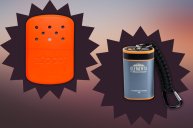An airline is putting its foot down and becoming the first to ban a popular travel item in the process. That's right, there's some new regulations on charging power banks if you're traveling with Air Busan.
This comes after a portable charger stored in the overhead storage bin caused a fire that destroyed one of the airline's passenger jets. Officials believed a lithium battery in the charging bank caused the fire. Now, Air Busan is banning charging power banks from carryons, according to Reuters.
They'll be checking travelers' bags too. The South Korean airline announced plans to check all carry-on luggage at the gates before allowing passengers to board. This is to prevent passengers from storing power banks in overhead bins. Currently, any devices with lithium batteries are already banned from being put in checked bags. This is to reduce the risk of fires.
Airline Bans Item
Fortunately, you can still bring your portable chargers on the airline. You just have to keep them with you so that you'll notice if they're overheating or catching fire. This comes after a fire caused a plane to burn down in Hong Kong. A flight attendant noticed the blaze from the overhead bin and evacuated the plane.




